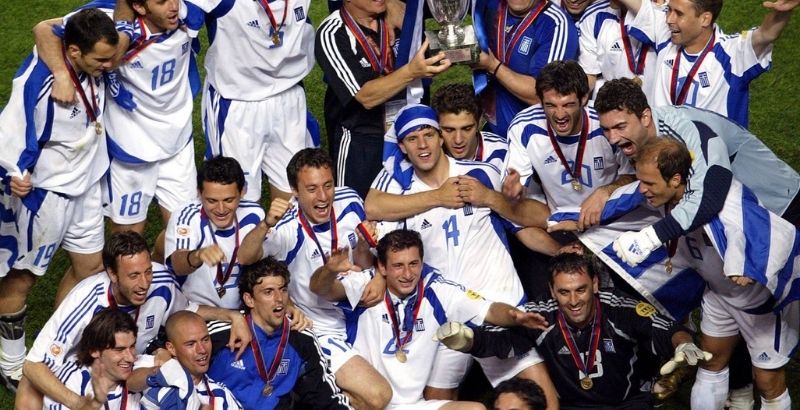
With all these billionaires, oligarchs, and sheiks controlling club football and the breach between modern and rich teams getting bigger every year, underdog success stories in the sport are harder to find. Therefore, by looking back and analyzing Greece’s Euro 2004 win, one of the biggest and most shocking upsets in modern sports history, Christopher André Marks’ documentary King Otto reminds us of the magic of international football while celebrating the legacy of a legendary coach.
Straightforwardly and linearly, using a mix of interviews and tv footage, King Otto examines how German coach Otto Rehhagel took the modest and unknown Greece National Team to the peak of European football in a matter of years. Leading the interviewees is Rehhagel himself, who, sitting on a throne, briefly talks about his life growing up in Germany during the war, his romance for football, and his success as a coach in the Bundesliga (Germany’s football league) before delving into his start as a coach for Greece.
There are no big revelations in King Otto, and director Marks doesn’t inquire far enough into the rough first months of Rehhagel’s reign; for example, talk of a dispute with one of the team’s stars is hinted at but never explored further. Furthermore, there’s no deep dive into his remarkable defensive strategies, just a superficial look into how journalists perceived his tactics as boring and offensive to the eyes.
The added value of this documentary is its study of cultural understanding as a basis for success. “Football is a reflection of society,” explained Rehhagel, whose arrival to Greece created a cultural clash. Germans and thus German football is always perceived as disciplined, a well-known trait in Rehhagel’s coaching style, which was a contrast to the Greek’s emotional approach. King Otto’s most revealing element is how Rehhagel had to understand Greece’s culture to create a common ground between his discipline and the player’s heart-guided passion.
The documentary also features interviews with players like Giorgos Karagounis, Antonios Nikopolidis, and Takis Fyssas (disappointingly, there are no interviews with hero Angelos Charisteas), as well as assistant coach Ioannis Topalidis who, deservedly, becomes a prominent figure in the film, just as he was on the pitch. King Otto highlights Topalidis’ utmost importance in the execution of Rehhagel’s plan to improve the team’s self-esteem and mental fortitude; his friendliness and smart translating skills helped the coach get closer with his players through respect, trust, and communication. Football history tends to ignore assistant coaches, so it was very satisfying to see Marks giving Greece’s unsung hero his due.
If, like me, you are a huge football fan who lived through Greece’s incredible 2004 triumph, you’ll have a blast reviving the team’s path to the final. You might even get teary-eyed with Dellas’s and Charisteas’ goals in the semi-finals and final respectively. And, whether accidental or not, the film shows the arrogance of English media, footballers, and fans over and over again, so, as an added bonus, it was particularly pleasant remembering how Rehhagel’s team shut them all up.
However, Marks misses the chance to make these moments even more joyful (particularly to non-fans) by failing to build drama while reviving the Euros and highlighting how incredibly unexpected Greece’s performances were. One quick example is the poor job the film does in explaining how extraordinary the Czech Republic team was in 2004; led by Juventus legend Pavel Nedved and boosted by exceptional in-form players such as Jan Koller, Milan Baroš, Tomáš Rosický, and Petr Čech, the Czechs were one of Europe’s finest team at the time. By not explaining this to the viewer, Marks weakens the impact of Greece’s unbelievable victory against them. Yes, the players’ celebrations and goal shouts from Greek announcers are uplifting and exciting, but the whole thing could’ve been even more euphoric with proper tension building.
Although superficial and way too conventional, King Otto is an exhilarating celebration of one of football’s most memorable underdog tales and a deserved thank you letter to the man who orchestrated it, Otto Rehhagel. It’s a nice little cinematographic time machine that takes football fans to the Olympus of real-life Greek fairy tales.
King Otto opens in theaters and across all VOD and digital platforms on March 25.
King Otto
-
Rating - 7/107/10
TL;DR
Although superficial and way too conventional, King Otto is an exhilarating celebration of one of football’s most memorable underdog tales and a deserved thank you letter to the man who orchestrated it, Otto Rehhagel. It’s a nice little cinematographic time machine that takes football fans to the Olympus of real-life Greek fairy tales.






